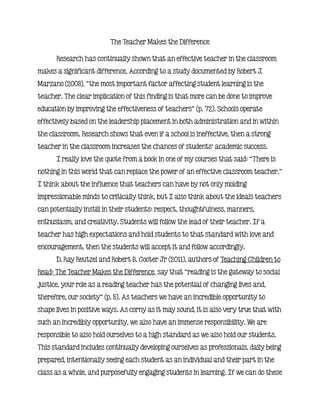
Teacher Impact on Student Success
- 1. The Teacher Makes the Difference Research has continually shown that an effective teacher in the classroom makes a significant difference, According to a study documented by Robert J. Marzano (2003), “the most important factor affecting student learning is the teacher. The clear implication of this finding is that more can be done to improve education by improving the effectiveness of teachers” (p. 72). Schools operate effectively based on the leadership placement in both administration and in within the classroom. Research shows that even if a school is ineffective, then a strong teacher in the classroom increases the chances of students’ academic success. I really love the quote from a book in one of my courses that said: “There is nothing in this world that can replace the power of an effective classroom teacher.” I think about the influence that teachers can have by not only molding impressionable minds to critically think, but I also think about the ideals teachers can potentially instill in their students: respect, thoughtfulness, manners, enthusiasm, and creativity. Students will follow the lead of their teacher. If a teacher has high expectations and hold students to that standard with love and encouragement, then the students will accept it and follow accordingly. D. Ray Reutzel and Robert B. Cooter Jr (2011), authors of Teaching Children to Read: The Teacher Makes the Difference, say that “reading is the gateway to social justice, your role as a reading teacher has the potential of changing lives and, therefore, our society” (p. 5). As teachers we have an incredible opportunity to shape lives in positive ways. As corny as it may sound, it is also very true that with such an incredibly opportunity, we also have an immense responsibility. We are responsible to also hold ourselves to a high standard as we also hold our students. This standard includes continually developing ourselves as professionals, daily being prepared, intentionally seeing each student as an individual and their part in the class as a whole, and purposefully engaging students in learning. If we can do these
- 2. things, then I really believe, at the core, that students will not only be successful in their academic endeavors, but they will continue on in their lives with confidence and determination to succeed in the future.
- 3. References Marzano, Robert J. (2003). What Works in Schools. Alexandria: Association for Supervision and Curriculum Development (ASCD). Ruetzel, D. Ray and Cooter Robert B. Jr. (2011). Teaching children to read: Seventh edition. New Jersey: Pearson Education Publishing Company.